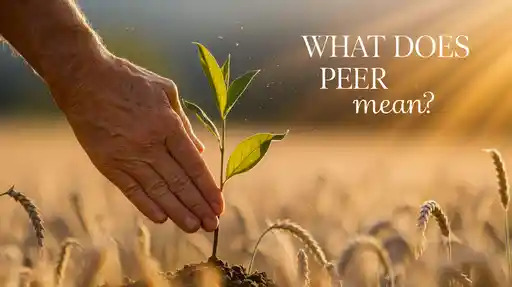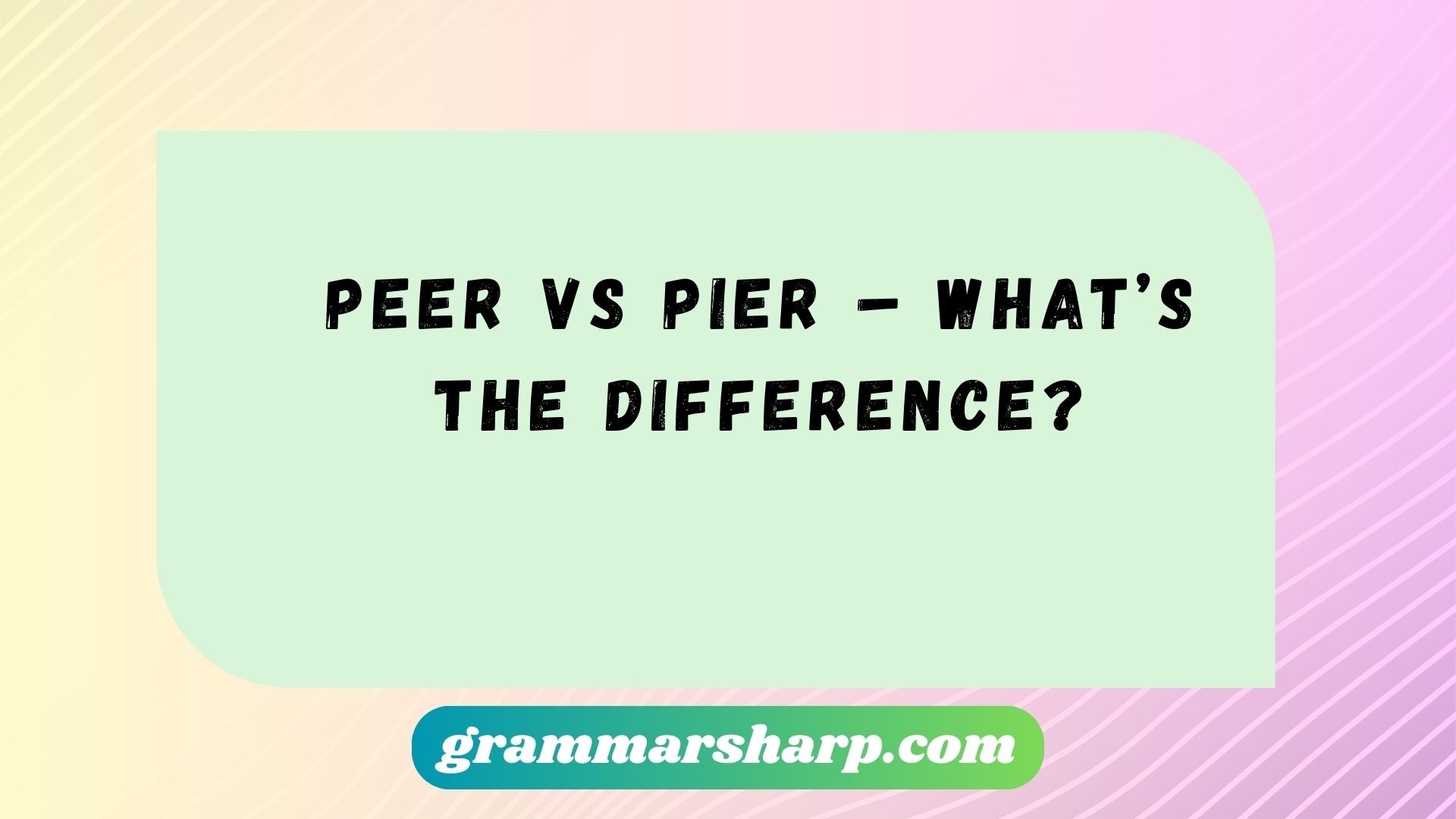The English language is full of tricky words that sound the same but mean completely different things. These words, called homophones, often confuse learners, writers, and even native speakers. One of the most common examples that trips people up is the pair peer and pier. While they may sound identical when spoken aloud, their meanings couldn’t be more different.
Imagine reading a sentence like, “She stood on the peer watching the sunset.” At first glance, you might picture someone with a friend. But the writer probably meant pier, a platform stretching out into the sea. Misusing these two words not only changes the meaning but can also make writing look careless.
The difference between peer and pier isn’t just a matter of spelling—it’s about context, history, and usage. These words carry different shades of meaning, rooted in fascinating linguistic backgrounds. Understanding them helps you write more clearly, avoid embarrassing mistakes, and even enrich your vocabulary.
This article breaks down peer vs pier in simple, practical ways. We’ll explore what each word means, how to use them correctly, fun memory tricks to keep them apart, and even dive into their history. By the end, you’ll never hesitate when choosing between peer and pier again.
Understanding Homophones
To understand peer vs pier, you first need to understand homophones. These are words that sound alike but have different meanings and spellings. English is notorious for them, and that’s one reason it’s considered one of the hardest languages to master.
Examples of common homophones include:
- Bare vs Bear – “bare feet” vs “a grizzly bear”
- Flour vs Flower – “baking flour” vs “a beautiful flower”
- Sight vs Site – “a lovely sight” vs “a construction site”
- Write vs Right – “to write a letter” vs “the right answer”
Homophones exist because English borrows heavily from other languages—Latin, French, German, Norse, and more. Over centuries, words merged in sound but kept their distinct spellings and meanings. That’s why we end up with confusing pairs like peer and pier.
What Does Peer Mean?

The word peer has several related but distinct meanings. At its core, it usually refers to a person of equal standing
Main Definitions of Peer:
- An equal or someone of the same rank:
“Students often learn better when they study with their peers.” - A nobleman in British history:
“The House of Lords consists of hereditary peers.” - To look closely or carefully at something:
“She peered through the fog to find the lighthouse.”
Examples of Peer in Sentences:
- “Children often feel pressure to fit in with their peers.”
- “He peered into the dark cave, unsure of what he might find.”
- “As a peer of the realm, the duke held significant influence in Parliament.”
Table: Different Uses of Peer
| Meaning | Example Sentence |
| Person of equal status | She discussed her project with her peers. |
| Member of British nobility | The peer was invited to the royal banquet. |
| Looking closely | He peered out the window to check the rain. |
What Does Pier Mean?
Unlike peer, which refers to people or looking, pier is all about structures—especially those built over water.
Main Definitions of Pier:
- A platform extending from land into water:
“We walked along the pier to watch the boats.” - A support structure in bridges or buildings:
“The bridge rests on several concrete piers.”
Examples of Pier in Sentences:
- “The fisherman cast his line from the end of the pier.”
- “The Santa Monica Pier is a famous tourist attraction.”
- “Strong piers held up the old stone bridge.”
Visual Idea:
Picture a wooden pier stretching out into the ocean with waves crashing below—this image sticks in the mind and helps differentiate it from peer, which deals with people.
Key Differences Between Peer and Pier
Let’s simplify the comparison.
| Word | Definition | Usage | Memory Trick |
| Peer | Equal, nobleman, or to look closely | “He peered at the map” / “She talked to her peers” | Think: People → Peer |
| Pier | Structure extending into water or support for bridges | “We fished off the pier” | Think: Water → Pier |
Quick Tip:
If you’re writing about people or looking → use peer.
If you’re writing about water or structures → use pier.
Common Mistakes and How to Avoid Them
It’s easy to confuse peer and pier because they sound identical. Here’s how to avoid the mistake:
Common Mistakes
- Writing “peer into the ocean from the peer” (should be pier).
- Saying “my pier group” when you mean peer group.
Memory Tricks:
- Peer = People. Both start with “P.”
- Pier = Ocean. Picture the “i” as a post in the water.
- Create a sentence: “My peers won’t meet me at the pier.”
Practice Sentences:
Fill in the blank:
- She asked her ______ for help with homework.
- The ship was tied up at the ______.
- He tried to ______ through the dense smoke.
(Answers: peers, pier, peer)
Peer in Different Contexts
The word peer appears in many fields, from social life to academia.
- Peer Pressure – The influence friends or equals have on someone’s choices.
- Peer Review – The process of experts evaluating academic work.
- Noble Peer – A titled aristocrat, especially in British history.
Examples:
- “Teenagers often give in to peer pressure when making decisions.”
- “Peer-reviewed journals are highly respected in science.”
- “Peers of the realm held political power in medieval England.”
Pier in Different Contexts
Piers aren’t just about fishing trips. They play important roles in tourism, engineering, and architecture.
- Tourism: Famous piers include Santa Monica Pier (USA), Brighton Pier (UK), and Navy Pier (Chicago).
- Engineering: Piers support bridges, wharves, and other heavy structures.
- Architecture: Stone piers often support arches in cathedrals and older buildings.
Fun Example:
The Eiffel Tower stands on four massive piers that anchor it to the ground, showing that piers aren’t always by the sea.
Fun Facts About the Two Words
- Peer comes from the Latin word par, meaning equal.
- Pier traces back to Old French per or Medieval Latin petrus, meaning stone.
- In medieval times, peer was used to describe nobility who were “equals” under the king.
- The world’s longest pier is the Progreso Pier in Mexico, stretching over 4 miles (6.5 km) into the Gulf of Mexico.
Conclusion
The words peer and pier may sound the same, but their meanings are worlds apart. Peer relates to people, equality, or looking closely, while pier refers to structures, especially those stretching into water. A simple way to remember: If it’s about people or eyes → peer. If it’s about water or buildings → pier.
By keeping this distinction in mind, you’ll write with clarity and confidence, avoiding one of the most common homophone mix-ups in English.
FAQs
Is “peer” only about friends?
No. While it often means friends or equals, it can also mean nobility or the act of looking closely.
Can “pier” also mean a bridge support?
Yes. In engineering, a pier refers to the vertical supports that hold up bridges.
How do I quickly remember the difference between peer and pier?
Think: Peer → People, Pier → Ocean.
Are “peer” and “pier” interchangeable?
Never. They sound the same but their meanings don’t overlap.
What are some famous piers?
Santa Monica Pier (USA), Brighton Pier (UK), Navy Pier (Chicago), and Progreso Pier (Mexico).

